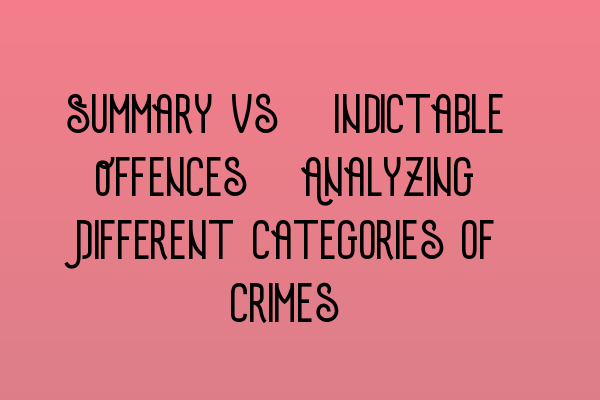Summary vs. Indictable Offences: Analyzing Different Categories of Crimes
When it comes to criminal law in the UK, it’s important to understand the distinction between summary offences and indictable offences. These two categories help in determining the seriousness of a crime and the appropriate legal procedures to be followed.
Summary Offences
Summary offences, also known as minor offences, are less serious crimes that are usually heard and decided by a magistrate in a magistrates’ court. Examples of summary offences include theft, common assault, and driving offenses such as speeding or driving without insurance.
Being convicted of a summary offence can result in a fine, community service, conditional discharge, or a short prison sentence of up to six months. It’s important to note that individuals charged with summary offences do not have the right to a trial by jury.
If you are preparing for the SQE 1 exam, it is crucial to understand the different types of offences. You can practice with SQE 1 Practice Exam Questions and check your progress with SQE 1 Practice Mocks FLK1 FLK2.
Indictable Offences
Indictable offences are more serious crimes that are usually heard in the Crown Court in front of a judge and a jury. Common examples of indictable offences include murder, rape, robbery, and drug trafficking.
If found guilty of an indictable offence, the penalties can be much more severe, including lengthy prison sentences. Individuals charged with indictable offences have the right to choose whether to have their trial in front of a jury or a judge.
If you are studying for the SQE 2 exam, it is essential to have a strong understanding of criminal law and the different types of offences. Consider enrolling in SQE 2 Preparation Courses to enhance your knowledge and increase your chances of success.
Understanding the difference between summary and indictable offences is crucial when discussing criminal law in the UK. The nature of the crime determines the legal procedure followed, and it’s important to have a skilled criminal defense solicitor who can guide you through the process.
Conclusion
Whether a crime falls under the category of a summary offence or an indictable offence has significant implications for both the accused and the legal proceedings that follow. The severity of the crime and the potential penalties dictate whether the trial will be held in a magistrates’ court or a Crown Court.
If you have any additional questions about summary or indictable offences, or if you require legal representation for a criminal case, contact SQE Criminal Law & Practice Law UK. Our team of experienced solicitors is here to assist you.
